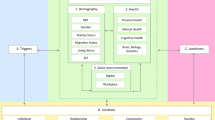Abstract
Some aspect of psychosocial criteria is commonly utilized by most transplant programs in assessing candidates' acceptability for transplantation. However, regardless of the assessment methodology, information obtained in pretransplant assessments may be limited given the evaluative nature of the assessment as well as the sensitive nature of the contents. Indeed, transplant candidates may present themselves in a favorable fashion, minimizing any negative traits or psychological dysfunction which they perceive might prevent transplantation. Unfortunately, there are limited data addressing the extent to which transplant candidates may present themselves in an overly positive light. This investigation surveys the prevalence of social desirability in lung transplant candidates as well as its association with self-reports of perceived stress. Further, the relationship between social desirability and interviewer ratings of transplant candidacy is examined. Subjects included 24 patients in end-stage organ failure being evaluated for lung transplant candidacy. Subjects completed the Perceived Stress Scale and a brief version of the Marlowe-Crowne Social Desirability Scale. Additionally, subjects were interviewer-rated on the Psychosocial Assessment of Candidates for Transplantation. Results indicate social desirability is a prevalent phenomenon in lung transplant candidates, with more than half of the sample scoring at or above the 84th percentile on the social desirability measure. Further, self-reports of perceived stress are moderately and inversely associated with social desirability (r=−.55,p ≤ .01). Social desirability was unrelated to interviewer-ratings of transplant candidates acceptability (r=.13,p ≤ .56). Future research might include larger samples of subjects, other organ transplant candidates, and more detailed assessments of symptom distress.
Similar content being viewed by others
References
Annas, G. J. (1985). The prostitute, the playboy, and the poet: Rationing schemes for organ transplantation.American Journal of Public Health, 75, 187–189.
Atterbury, C. F. (1986). The alcoholic in the lifeboat: Should drinkers be candidates for liver transplantation?Journal of Clinical Gastroenterology, 8, 1–4.
Beresford, T. (1992). Alcohol and liver transplantation. In J. Craven & G. M. Rodin (Eds.),Psychiatric aspects of organ transplantation (pp. 22–32). New York: Oxford.
Bonanno, G. A., & Singer, J. L. (1990). Repressive personality style: Theoretical and methodological implications for health and pathology. In J. L. Singer (Ed.),Repression and dissociation: Implications for personality theory, psychopathology, and health (pp. 435–470). Chicago: University of Chicago Press.
Burleson, B. R., Wilson, S. R., Waltman, M. S., Goering, E. M., Ely, T. K., & Whaley, B. B. (1988). Item desirability effects in compliance-gaining research: Seven studies documenting artifacts in the strategy selection procedure.Human Communication Research, 14, 429–486.
Caine, N., Sharples, L., Smyth, R., Scott, J., Hathaway, T., Higenbottam, T., & Wallwork, J. (1991). Survival and quality of life of cystic fibrosis patients before and after heart-lung transplantation.Transplantation Proceedings, 23, 1203–1204.
Caplan, A. L. (1987). Equity in the selection of recipients for cardiac transplantation.Circulation, 75, 10–19.
Carnrike, C. L. M., Jr. (1994). Psychosocial assessment of varied transplant candidates/donors: Is a unified approach possible? In C. L. M. Carnrike, Jr. (Chair),Psychosocial assessment in transplantation: A symposium. Symposium conducted at the Third Biennial Conference on Psychiatric, Psychosocial and Ethical Issues in Organ Transplantation, Richmond, VA, Oct.
Carnrike, C. L. M., Jr., & Lyman, K. (1995).Self-reported distress in heart and lung transplant candidates. Paper presented at the meeting of the Society for Heart and Lung Transplant Social Workers, Chicago, IL, Sept.
Carnrike, C. L. M., Jr., Burker, E., Wright, M. T., Wilkins, J. W., & Egan, T. M. (1994).Differences in self-reported psychological distress between transplant candidate groups. Poster presented at the Third Biennial Conference on Psychiatric, Psychosocial and Ethical Issues in Organ Transplantation, Richmond, VA, Oct.
Chen, G. (1994). Social desirability as a predictor of argumentativeness and communication apprehension.Journal of Psychology, 128, 433–438.
Cohen, S., Kamarck, T., & Mermelstein, R. J. (1983). A global measure of perceived stress.Journal of Health and Social Behavior, 24, 385–396.
Craven, J. (1990). Psychiatric aspects of lung transplant.Canadian Journal of Psychiatry, 35, 759–764.
Crossen, J., Keefe, E., Benner, K., Garvey-Schray, A., Whalen, J., & Mesch, J. (1994). Psychological assessment of quality of life following liver transplantation.Journal of Clinical Psychology in Medical Settings, 1, 71–81.
Crowne, D. P., & Marlowe, D. (1960). A new scale of social desirability independent of psychopathology.Journal of Consulting Psychology, 24, 349–354.
Crowne, D. P., & Marlowe, D. (1964).The approval motive: Studies in evaluative dependence. New York: John Wiley & Sons.
Deshields, T., Miller, L., & Mannen, K. (1994).Social desirability as a variable affecting self-report in patients presenting for heart transplantation (abstract). Proceedings of the Third Biennial Conference on the Psychiatric, Psychosocial and Ethical Issues in Organ Transplantation, Richmond, VA, Oct.
Edwards, A. L. (1953). The relationship between the judged desirability of a trait and the probability that the trait will be endorsed.Journal of Applied Psychology, 37, 90–93.
Edwards, A. L. (1957).The social desirability variable in personality assessment and research. New York: Dryden.
Fox, K. F. A. (1992). The use of social marketing to encourage organ donation. In J. Shanteau & R. J. Harris (Eds.),Organ donation and transplantation (pp.159–167). Washington, DC: American Psychological Association.
Frazier, P., Davis-Ali, S., & Dahl, K. (1994). Correlates of noncompliance among renal transplant recipients.Clinical Transplantation, 8, 550–557.
Freeman, A., Davis, L., Libb, J. W., & Craven, J. (1992). Assessment of transplant candidates and prediction of outcome. In J. Craven & G. M. Rodin (Eds.),Psychiatric aspects of organ transplantation (pp. 9–21). New York: Oxford University Press.
Fukunishi, I. (1993). Anxiety associated with kidney transplantation.Psychopathology, 26, 24–28.
Harris, R. C., Dew, M. A., & Davidson, S. (1994).Compliance with diet following heart transplantation: Difficulties and strategies for improvement. Poster presented at the Third Biennial Conference on Psychiatric, Psychosocial and Ethical Issues in Organ Transplantation, Richmond, VA, Oct.
House, R. M., & Thompson, T. L. (1988). Psychiatric aspects of organ transplantation.Journal of the American Medical Association, 260, 535–539.
Jensen, M. R. (1987). Psychobiological factors predicting the course of breast cancer.Journal of Personality, 55, 317–342.
Kelly, P., Bart, C., & Craven, J. (1992). Lung transplantation. In J. Craven & G. M. Rodin (Eds.),Psychiatric aspects of organ transplantation (pp. 205–223). New York: Oxford University Press.
Kneiser, A. W., & Temoshok, L. (1984). Repressive coping reactions in patients with malignant melanoma as compared to cardiovascular disease patients.Journal of Psychosomatic Research, 28, 368–378.
Koch, U., & Muthny, F. (1990). Quality of life in patients with end-stage renal disease in relation to the method of treatment.Psychotherapy and Psychosomatics, 54, 161–171.
Levenson, R. W., & Mades, L. L. (1980).Physiological response, facial expression, and trait anxiety: Two methods for improving consistency. Paper presented at the annual meeting of the Society for Psychophysiological Research, Vancouver, British Columbia, Canada, Oct.
Levenson, J. L., & Olbrisch, M. E. (1987). Shortage of donor organs and long waits: New sources of stress for transplant patients.Psychosomatics, 28, 399–403.
Littlefield, C. (1992). Social support and organ transplantation. In J. Craven & G. M. Rodin (Eds.),Psychiatric aspects of organ transplantation (pp. 50–66). New York: Oxford.
Lowy, F., & Martin, D. (1992). Ethical considerations in transplantation. In J. Craven & G. M. Rodin (Eds.),Psychiatric aspects of organ transplantation (pp. 108–120). New York: Oxford.
Lucey, M., Merion, R., Henley, K., Campbell, D., Turcotte, J., Nostrant, T., Blow, F., & Beresford, T. (1992). Selection for and outcome of liver transplantation in alcoholic liver disease.Gastroenterology, 102, 1736–1741.
Marlowe, D., & Crowne, D. P. (1961). Social desirability and response to perceived situational demands.Journal of Consulting Psychology, 25, 109–115.
McAleer, M. J., Copeland, J., Fuller, J., & Copeland, J. C. (1985). Psychological aspects of heart transplantation.Journal of Heart Transplantation, 4, 232–233.
McDonough, E. M., Deshields, T., Brown, W. W., & Miller, L. W. (1994).A comparison of predictors of perceived compliance among cardiac and renal transplant populations. Poster presented at the Third Biennial Conference on Psychiatric, Psychosocial and Ethical Issues in Organ Transplantation, Richmond, VA, Oct.
McDonough, E. M., Deshields, T., Schmid, S., Richards, S., Brown, W. W., & Garvin, J. (1994).Compliance rates in hemodialysis patients listed for kidney transplant versus patients not listed for transplant. Poster presented at the Third Biennial Conference on Psychiatric, Psychosocial and Ethical Issues in Organ Transplantation, Richmond, VA, Oct.
Miller, C., Kamean, J., & Berk, P. (1994). Liver transplantation for alcoholic hepatitis? An unanswered question.Alcoholism: Clinical and Experimental Research, 18, 224–227.
Olbrisch, M. E., Levenson, J. L., & Hamer, R. (1989). The PACT: A rating scale for the study of clinical decision-making in psychosocial screening of organ transplant candidates.Clinical Transplantation, 3, 164–169.
Olbrisch, M. E., Levenson, J. L., Sherwin, E. D., & Best, A. M. (1994). Validation of psychosocial assessments of cardiac transplant candidates.Journal of Heart and Lung Transplantation, 13, S70.
Omery, A. (1990). Ethical issues. In S. L. Smith (Ed.),Tissue and organ transplantation (pp. 103–116). St. Louis, MO: Mosby.
Palmer, J. (1994).Information expectations of adolescents for post kidney transplant education. Poster presented at the Third Biennial Conference on Psychiatric, Psychosocial and Ethical Issues in Organ Transplantation, Richmond, VA, Oct.
Riether, A. M. (1990). Psychiatric aspects of transplantation. In S. L. Smith (Ed.),Tissue and organ transplantation: Implications for professional nursing practice (pp. 117–143). St. Louis, MO: Mosby.
Schwartz, G. E. (1990). Psychobiology of repression and health: A systems approach. In J. L. Singer (Ed.),Repression and dissociation: Implications for personality theory, psychopathology, and health (pp. 405–434). Chicago: University of Chicago Press.
Schwartz, G. E., & Jamner, L. D. (1986). Subjective/respiratory dissociation and the repressive coping style.Psychophysiology, 23, 459–460.
Seidel, K. L., Forster, J., Twillman, R., & Delcore, R. (1994).Psychological assessment of liver transplant candidates: Comparison of the TERS and the PACT. Paper presented at the Third Biennial Conference on Psychiatric, Psychosocial and Ethical Issues in Organ Transplantation, Richmond, VA, Oct.
Stevens, M. J. (1993–1994). Predictors of responses to acute pain.Imagination, Cognition and Personality, 13, 311–321.
Strahan, R., & Gerbasi, K. C. (1972). Short, homogeneous versions of the Marlowe-Crowne Social Desirability Scale.Journal of Clinical Psychology, 28, 191–193.
Waterman, S., & Nelson, M. K. (1994).Psychometric and clinical approaches to assessing social support. Paper presented at the Third Biennial Conference on Psychiatric, Psychosocial and Ethical Issues in Organ Transplantation, Richmond, VA, Oct.
Weinberger, D. A. (1990). The construct validity of the repressive coping style. In J. L. Singer (Ed.),Repression and dissociation: Implications for personality theory, psychopathology, and health (pp. 337–386). Chicago: University of Chicago Press.
Whyte, W. H. (1956).The organization man. New York: Simon and Schuster.
Author information
Authors and Affiliations
Rights and permissions
About this article
Cite this article
Carnrike, C.L.M., McCracken, L.M. & Aikens, J.E. Social desirability, perceived stress, and PACT ratings in lung transplant candidates: A preliminary investigation. J Clin Psychol Med Settings 3, 57–67 (1996). https://doi.org/10.1007/BF01989289
Issue Date:
DOI: https://doi.org/10.1007/BF01989289




